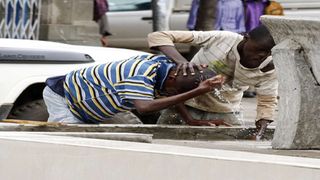
Street children in Nakuru town.
| File | Nation Media GroupNakuru
Premium
Street children saga, political rivalry mar Nakuru’s city status bid
What you need to know:
- The Senate Labour Committee has slammed the brakes on the upgrade plans, until full clearance is obtained.
- The committee noted that 41 children were rounded up on February 6, 2019 in an effort to “clean up” Nakuru.
An ambitious bid to elevate Nakuru town to a city has been bogged down by political rivalry between Governor Lee Kinyanjui and Senator Susan Kihika.
Mr Kinyanjui's administration has been accused of rounding up and dumping street children in Chemasusu Forest in Baringo County last year.
The Senate Labour Committee, led by Nairobi Senator Johnson Sakaja, has slammed the brakes on the upgrade plans, until full clearance is obtained.
The committee noted that 41 children were rounded up on February 6, 2019 in an effort to “clean up” Nakuru and speed up the town’s elevation to the more prestigious city status.
The Senate committee wants the Directorate of Criminal Investigations to get to the bottom of the matter and ensure those behind the street children’s saga are prosecuted.
The committee also wants the Nakuru county government to address the street families menace.
Milestone project
Governor Kinyanjui said the upgrade is a critical milestone project and is unstoppable.
"Governor Kinyanjui’s administration should resign for dumping street children in Chemasusu Forest," said Senator Kihika.
However, the county boss has absolved his administration from any wrongdoing and accused Ms Kihika of using the Senate to settle political scores.
"Senator Kihika has a hand in the committee’s recommendations. The Senate should not politicise the matter," said Mr Kinyanjui.
"Senators should separate politics from development. The push for Nakuru to become a city will outlive politicians and should be supported by all," he added.
The governor said the town has its own challenges but his administration is working hard to address them.
The Senate committee on Devolution and Intergovernmental Relations is set to table its report on the eligibility of Nakuru town to be granted a city status.
The committee has been scrutinising the Nakuru county government’s application for the upgrade.
The application was handed over to the House team by Senate Speaker Ken Lusaka, who asked the members to establish if the provisions of the Urban Areas and Cities Act have been complied with.
"It is the first time the House is being called upon to consider such a matter and l urge members to look into this matter deeply and properly and submit a report to the House for debate," said Mr Lusaka.
Governor Kinyanjui has pleaded with senators to support Nakuru town's bid.
No smooth sailing
It will, however, not be smooth sailing for the county boss and his administration.
The governor’s allies fear that Ms Kihika, who has declared interest in the Nakuru gubernatorial seat in the 2022 elections, might influence the final report.
This, they add, would deny Mr Kinyanjui a key plank in his campaigns to defend his seat.
Senator Kihika led a section of local leaders to reject the upgrade project, saying the town needs 10 years to prepare for a city status.
The leaders gave at least 10 conditions they wanted met before the upgrade.
The Senate committee has been reviewing the report before it is tabled and debated in the House.
Mr Kinyanjui’s administration says attaining a city status would improve housing, transportation, sanitation, utilities, land use and communication.
According to the Urban Areas and Cities (Amendment) Act, 2017, approval of a city status is subject to a raft of conditions.
These include a population of at least 250,000 people, ability to provide services such as water and sanitation, street lighting, proper drainage systems, an effective public transport system, health services, ambulance services and public cemeteries.
A town aspiring for a city status must also have a fire fighting and disaster management system in place.
A city should also have several recreational facilities, state-of-the-art stadia, good roads and solid waste management systems.
Educational institutions such as early childhood development centres, technical training institutions, community centres, conference facilities and air transport facilities must be upgraded.
A city must also have reliable sources of energy and electricity supply.
Raise taxes
Experts say that once a town becomes a city, rates and taxes might be raised to enable the city to support its operations.
"A city must have solid revenue capacity to sustain its operations. This might trigger raising of parking fees and several other taxes," says Mr Jeremiah Kipkorir, a governance expert.
Residents and the business community feel that more needs to be done before the town is elevated.
They want the county government to address issues such as planning of the town, garbage disposal, housing, street lighting, roads and other infrastructure.
Other challenges they want the authorities to fix before pushing for a city status include traffic jams and setting up of eco-friendly amenities.
In 2011, Nakuru was named the cleanest town in East Africa by a United Nations agency.
However, it has over the years lost its splendour, which the current administration is seeking to regain.
As part of preparations for a city status, Mr Kinyanjui’s administration has rolled out projects such as upgrading of the town’s road network, construction of the Sh3 billion Lanet Airstrip, a modern fire station, renovation of Nyayo Gardens and upgrading of the Gioto dumpsite.





